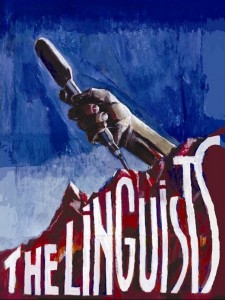 As Scott Simon reminds us on Weekend Edition Saturday this morning, The Linguists will premiere on PBS stations across the nation this Thursday. (Check and double-check your local listings for the exact time (or even the day) of the premiere, which may vary.)
As Scott Simon reminds us on Weekend Edition Saturday this morning, The Linguists will premiere on PBS stations across the nation this Thursday. (Check and double-check your local listings for the exact time (or even the day) of the premiere, which may vary.)
I'm looking forward to finally seeing the film. I'm also looking forward to David Harrison's upcoming visit to my corner of Language Log Plaza on April 23 and 24. If you find yourself in the San Diego area around that time, come on by.
I have to add that I was a bit disappointed with Scott Simon's interview with David Harrison and Greg Anderson this morning. After a fairly good introduction and a good first couple of questions (asking what first brought David and Greg together, and what happens when a language dies), Scott decides to lighten things up a bit and chuckles to himself as he says: "May I ask, each of you in turn: what's the strangest language you think you've ever heard?" Greg (rather wisely) prompts David to go first, and David avoids immediately taking the bait by saying, "Well, they're all strange from a certain point of view, and English is strange, but…" — at which point Scott interjects: "English can be particularly strange." (David: "It can be, indeed.") Things devolve into a discussion of "strange language sounds", the idea that some technical linguistics terms sound obscene, and so on — it gets serious and picks up again towards the end, but Scott can't resist closing with more chuckles and another reference to the language Birhor (sounds like "beer whore"). Sigh.



